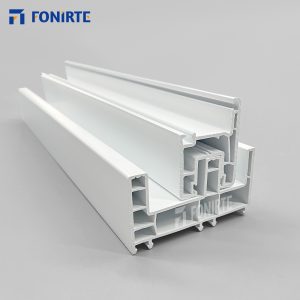
1. The Economics of Deception
Laminated UPVC masters the art of “faux-luxury” through physics, not magic:
– Wood Grain Wizardry: 1200dpi printed films replicate oak medullary rays and mahogany pore structures at 1/5 the cost of real hardwood.
– Metallic Mirage: Vacuum-deposited aluminum layers create brushed steel or antique bronze finishes that fool even architects up close – all while avoiding metal’s $200/m²+ price tag.
Cost Comparison:
– Teak Wood Window: $850/m² (needs refinishing every 3 years)
– Laminated UPVC: $180/m² (zero maintenance for 25+ years)
2. Hidden Savings That Multiply
The real value isn’t just in material costs – it’s in lifecycle economics:
– Installation Speed: Clip-together systems install 3x faster than wood/metal, cutting labor costs by 40%.
– Zero Maintenance: No sanding, staining, or repainting – saving $15/m²/year versus painted aluminum.
– Thermal Payback: Multi-chamber designs slash HVAC loads, paying for themselves in <7 years via energy savings.
3. Durability Disguised as Beauty
That beautiful finish isn’t just skin-deep:
– Impact-Resistant Core: Modified UPVC with titanium dioxide (TiO₂) additives withstands 50J impacts – surviving everything from hailstorms to stray baseballs.
– UV-Stable Chemistry: Unlike paint that fades, laminates use inorganic pigments that retain color for decades (ΔE<2 after 100,000 hours Xenon testing).
4. Customization Without Custom Prices
Digital lamination enables **mass customization:
– Batch Size 1 Production: Laser-cut films allow unique patterns per window at no extra cost.
– Instant Color Swaps: Peel-and-stick laminates let buildings “change clothes” during renovations.
Pro Tip: For budget projects, specify “Dual-Side” laminates – premium finish outside, basic white inside – cutting costs another 15%.
The Future of Faux
Emerging tech will soon offer:
– Dynamic Finishes: Electrochromic laminates that change opacity like smart glass (at 1/10 the cost).
– Self-Repairing Films: Microcapsules that fix scratches when heated by sunlight.
Final Verdict: This isn’t just cheap imitation – it’s smart material science making luxury design democratically accessible.
(Ideal for: Hotel chains needing consistent aesthetics, developers targeting LEED certification, and homeowners who want yacht-grade looks on a dinghy budget.)






